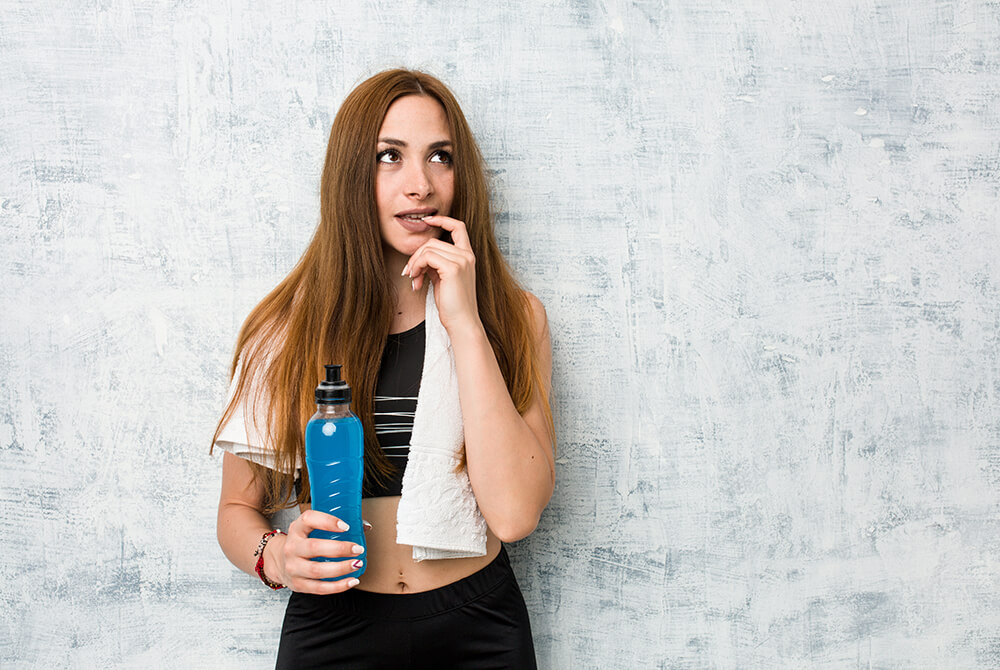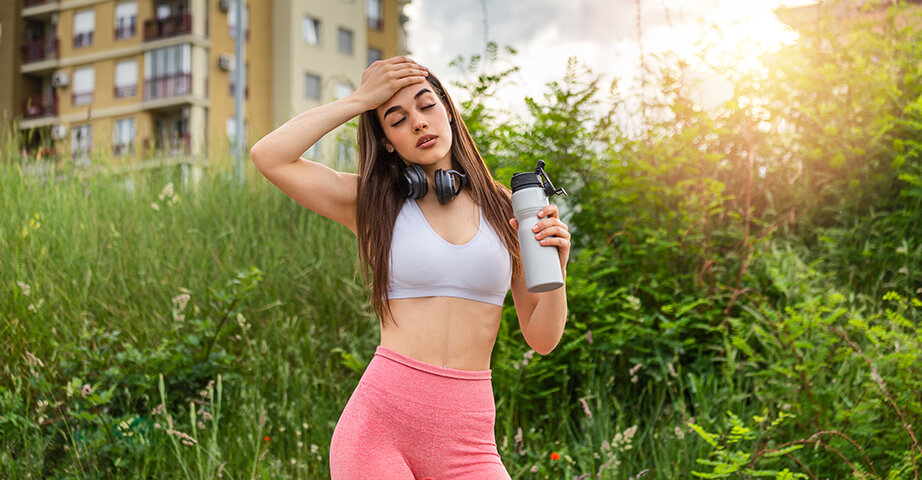Why does isotonic hydrate better than water? + 3 recipes for home-made isotonic drinks

The isotonic drink helps to ensure optimal hydration of the body due to its sugar and mineral content in comparison to water. Isotonic drinks are good for intensive workouts and... hangovers. How does isotonic drink work? When is it worth using it and when is it enough to drink water? How to make a homemade isotonic drink?
What is an isotonic drink?
It is said that isotonic drinks hydrate better than water. Isotonic drinks stand out on shop shelves and are drunk by athletes. What is hidden under this name? Basically, an isotonic drink is a drink that, apart from water, contains simple sugars and minerals (electrolytes) in such proportions to water as to accelerate its absorption in the small intestine.. The whole process is based on the equalisation of the concentration difference. When nutrients (sugars, mineral salts) are absorbed in the intestines and then transported into the bloodstream and cells, their concentration increases. Therefore, the body absorbs water faster from the intestinal tract and transports it further - to lower the concentration of nutrients. In other words, to provide more water in which these ingredients can dissolve.
And now a little more precisely about tonicity and osmolality - the parameters that are responsible for the types of drinks we call isotonic, hypotonic and hypertonic. Tonicity is the ability of the liquid surrounding the cell to cause the cell to absorb or release water. Osmolality on the other hand, refers to the concentration of dissolved substances in a liquid solution (in our case a drink) compared to another solution (e.g. blood, intracellular fluid). Isotonics have an osmolality and tonicity similar to body fluids, which accounts for their beneficial rehydration properties.. Isotonics prevent both dehydration and overhydration of cells.
What is the significance of isotonic drinks for the body?
Isotonic drinks are a source of electrolytes, fast energy in the form of simple sugars and water. Their role is to replenish fluids in the body and avoid dehydration due to electrolyte losses that occur during intensive sweating or other water loss - increased urination, diarrhoea or vomiting. Isotonic drinks, apart from electrolytes, provide energy during the workout, which is important in the case of a long or very intensive effort. They can also be used as an element of a post-workout meal to quickly replenish muscle glycogen losses during exercise.. An isotonic drink is characterised by the content of sugars at the level of 4-8 g in 100 g.
Recommended isotonic drinks
When does an isotonic drink rehydrate best?
Not every isotonic drink has the same rehydrating properties. They depend above all on its sugar content. For a long time, it was believed that every isotonic drink is better than a hypotonic (i.e. a drink with a lower mineral salt and sugar content than an isotonic drink). However, an analysis of scientific studies carried out by scientists from Massey University in New Zealand has shown that the most optimal hydration of the body is achieved when the sugar content is somewhere between a hypotonic and an isotonic, i.e. no more than 4 g in 100 g of a drink. Therefore, an isotonic drink with 4 g of sugars in 100 g rehydrates better than water.
So why should you not just hydrate yourself with water? On a daily basis, water is definitely sufficient. However, if electrolyte losses occur, e.g. through sweat, water does not provide an adequate rehydration function because it lacks mineral salts.. Drinking a lot of water with a low electrolyte content will mainly result in more frequent urination, but not in quick rehydration. Water will not be absorbed into the cells to avoid further dilution of the electrolytes, whose concentration is already too low.
Who needs an isotonic drink?
There is no need for an average person who does not do any physical activity and is in good health to drink an isotonic drink on a daily basis. Water is definitely sufficient for regular body hydration. An isotonic is useful when fluid losses from the body (with sweat, urine, food contents) exceed the average and the body's demand for electrolytes increases. Such situations include:
- physical activity lasting more than one hour,
- physical activity lasting less than one hour but of a very high intensity,
- working in hot conditions,
- chronic diarrhoea,
- chronic vomiting,
- increased urination,
- drinking alcohol, hangover.
Isotonic is a good choice to drink during intense, long training and after training, as well as during hard, physical work. To avoid a severe hangover, it is advisable to drink an isotonic already during alcohol consumption and not only the next day, when the effects of dehydration due to alcohol have to be repaired rather than prevented.
It is important to remember that an isotonic drink is not a good option for everyone. People who need to control their sugar intake, e.g. those suffering from insulin resistance and diabetes, may feel unwell after taking a large dose of sugar in an isotonic drink.. Isotonic drinks should also be avoided by people on a low-sodium diet, such as those with high blood pressure.

Recipe for a homemade isotonic drink
How to make a homemade isotonic drink? It is essential to know the proportions of sugar and salt to water. A recipe for an isotonic drink will always contain 40 g of sugar (based on research we assume this amount to be the most effective for body rehydration) and about 1 g of table salt (sodium chloride) per one litre of water. Simply mix the ingredients together and you have a ready-made isotonic drink. Remember that the sugar must be a monosaccharide or a disaccharide such as glucose, fructose and sucrose. Sugar alcohols such as xylitol erythrol, do not affect osmolality and tonicity in the same way as simple sugars..
Based on the standard recipe - 40 g of sugar (3.5 tablespoons of granulated sugar or 2 tablespoons of honey) + 1 g of salt (approx. 1/4 teaspoon) + 1 litre of water - you can create very different flavour variations of homemade isotonic drinks, as long as the sugar and salt to water ratio is maintained.
Homemade isotonic drink is definitely a better option than ready-made drinks from shops. Their composition is not always perfect. Pay extra attention to the quantity and quality of colourings and flavours in store-bought isotonic drinks..
Homemade apple-mint isotonic drink
400 ml of apple juice + 600 ml of water + 1/4 teaspoon of salt + 3 sprigs of fresh mint ( combine all the ingredients, crush the mint in the drink)
Ginger isotonic drink
2 tablespoons of honey + juice of 1 lemon + 850 ml of water + infusion of several thin slices of ginger poured into 100 ml of boiling water (combine all the ingredients)
How to make a watermelon isotonic drink?
500 g of watermelon without rind + 500 ml of coconut water + a pinch of salt (mix watermelon without seeds with coconut water, add salt)
How about isotonic powder?
Powdered isotonics. can also be bought in pharmacies and shops with dietary supplements. Simply dissolve a tiny packet in a specified amount of water to obtain a drink with rehydrating properties and providing a dose of electrolytes. Powdered isotonic drink is a very convenient solution when there is no time or conditions to prepare a homemade isotonic drink. Powdered isotonic drinks of various flavours are available on the market, which allows you to select something according to your preferences and avoid monotony. The undoubted advantage of powdered isotonic drinks is the content of various electrolytes - potassium, sodium, magnesium and calcium - not only sodium, as it happens in recipes for homemade isotonic drinks. When buying powdered isotonic drinks, it is worth paying attention to the quality and quantity of colourings as well as flavourings and choose those with the addition of natural origin.
